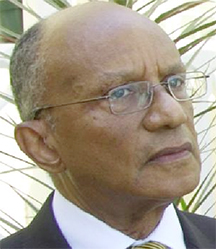Executive Director of the National Integrity Action of Jamaica (NIAJ) Professor Trevor Munroe says while there should be sustained focus on corruption in public office, the private sector must come under equal scrutiny.
“We don’t focus enough on the private sector’s engagement in corruption. Yes we need to sustain the focus on public officials. Yes we need to look at the abuse of entrusted political authority for illicit gain… but we now need to take more seriously the abuse of market power for personal and private gain by transnational corporations in the way they have been doing recently,” Munroe said.
He was speaking to many private sector officials from across the country who were in attendance at the Transparency Institute of Guyana Inc’s second annual fund-raising dinner last Friday night at the Pegasus Hotel.

Pointing to the many international organisations which have been found guilty of both insider trading and other financial irregularities, Munroe opined that it was time Transparency International redefined its meaning of corruption to include the private sector.
Munroe made reference to a World Bank finding which stated that in 2004 US$1 trillion was paid in bribes from private sector to public sector functionaries. “It is not an accident that despite the global crisis [in which] hundreds of thousands of people are losing their homes and many becoming unemployed that not one senior official in the financial sector has been prosecuted, incarcerated or served time. What they do is pay fines and remain rich… while the people suffer,” he stated. “This is not fair. This is not just. And we must say to Transparency Inter-national please amend your definitions in order to facilitate as much focus on private sector corruption as we do on the public sector,” he added.
International donor agencies were not spared as the Jamaican professor called on them to exhibit increased levels of probity into how the monies they give are used regardless if they are accused of “meddling” in the domestic affairs of countries.
He pointed to a United Nations report which estimates that a whopping 30 per cent, translated to $300,000 of every $1 million, goes to the pockets of the public and private sector officials robbing the people who need it most.
“Our international deve-lopment partners need to understand that what aid they give to us is coming from their taxpayers under pressure and they have an obligation to ensure that that aid reaches our taxpayers… and is not interrupted along the road,” he asserted. “I need to make it absolutely clear that even at the risk of accusations of interference that their money, their aid, their grant, is intended for the people and not for the pockets of the corrupt,” he added.
Using data provided from independent organisations around the world, he noted that corruption was the most talked about issue among the “ordinary citizenry” and as such governments should understand the seriousness and address it.
He recommended that there be established corruption risk assessment activities and that Guyana could undertake a national integrity system study to “ground anti-corruption activities in a systemic understanding of which are the strong and weak institutions” so as determine what should be priority measures.
Further, he said laws should be made and be enforced which ensure that political parties are not only registered but that there is public to disclosure of their funds and financing. “None of us can know who is giving how much to political parties here in our own Caribbean territories and it is they who exercise power over us; not Obama’s Democratic Party or Romney’s Republican Party…We need to know who is giving how much to who and, therefore, who has the capacity to exert undue influence on whom,” Munroe said.
“The longer we take to plug this and similar loopholes is the more our people [will] lose confidence in the rule of law, in the justice system and ultimately in democratic governance,” he added.





